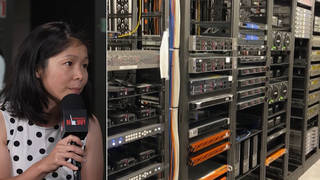
Guests
- Louisa Edgerlyadjunct instructor at Seattle University. She will join other adjunct teachers, tenure-track professors and students in National Adjunct Walkout Day.
Today is National Adjunct Walkout Day. Adjunct professors on campuses across the country hope to draw attention to what many say are poverty-level wages, with no chance to advance to a tenured track position. We are joined by Louisa Edgerly, an adjunct instructor at Seattle University, where she will join other adjuncts and students — along with tenure-track professors — in walking out at noon today.
Transcript
JUAN GONZÁLEZ: We end the show with another look at college education, this time from the perspective of those who teach. Today is National Adjunct Walkout Day. Adjunct professors on campuses across the country hope to draw attention to what many say are poverty-level wages, with no chance to advance to a tenure-track position.
AMY GOODMAN: For more, we go to Seattle, where we’re joined by Louisa Edgerly, an adjunct instructor at Seattle University, where she’ll join other adjuncts and students today, along with tenure-track professors, in walking out at noon.
Welcome to Democracy Now! Why are you striking?
LOUISA EDGERLY: Thank you for having me, and thank you for covering this important issue. We’re striking today and walking out, really, to raise awareness nationally of the situation that adjunct faculty face across the country, and really to highlight our desire for higher-quality education and more support for faculty across the board.
JUAN GONZÁLEZ: And talk to us about the extent of the problem, again, with these nonprofit universities and their increasing use of adjuncts or part-timers to teach their courses.
LOUISA EDGERLY: Yes, as a matter of fact, over the last 30 years, the proportion of faculty on the tenure track versus faculty not on the tenure track has shifted from about 75 percent who used to be on the tenure track to, today, about three-quarters of the faculty in higher education are nontenure-track, either adjunct, contingent—some are part-time, some are full-time. But across the board, we are paid less than our tenure-track colleagues. We have few, sometimes no benefits, sometimes no office space, very little time to meet with students. Many of us end up having to work multiple jobs at different campuses just in order to make ends meet.
AMY GOODMAN: Tell us your own experience, Louisa Edgerly.
LOUISA EDGERLY: Well, I finished my degree in 2010 right in the middle of the economic collapse and the worst academic job market, possibly, in history. And like many of my classmates and many people across the country, I have been adjuncting and working several jobs since then. I work at the University of Washington, been fortunate to get some work at Seattle University. I’ve had temporary, part-time staff jobs. I also coach rowing. So, at any one point, I’ve had as many as five different jobs, working between them, traveling from campus to campus, and managing the needs of my students and getting everything done.
AMY GOODMAN: How many classes do you have to teach to make ends meet? And how much do you get paid per class?
LOUISA EDGERLY: It varies by institution how much they pay. Seattle University currently pays—we’re on the quarter system on the West Coast, so the numbers are slightly different than they would be on a semester system—between $4,000 and $5,000 per class. And there are no benefits attached to teaching a single class. In order to make a living wage for the Seattle area, you actually wouldn’t be able to do that, putting together adjunct classes here and there. Most schools will cap the number of single classes that you can teach, the number of quarterly contracts that you can have, so that you don’t become eligible for benefits. So, to make the median wage in Seattle, teaching as an adjunct would be almost impossible. Three classes per quarter, sometimes four classes per quarter, may be possible, but also very difficult to manage.
JUAN GONZÁLEZ: And if people listening to this or hearing this want to get involved, how could they do this in the movement that you’re building?
LOUISA EDGERLY: There are a number of organizations that have begun to address the concerns of adjunct faculty. There’s the New Faculty Majority. There’s also Adjunct Action. We have been organizing on our campus with the Service Employees International Union, SEIU Local 925. So, unionizing movements for adjunct faculty across the country are really gaining steam. I would encourage people to look at organizing on their own campuses, at joining some of the other groups that support adjunct faculty.
AMY GOODMAN: And, Louisa Edgerly, as we wrap up, just to be clear, an adjunct professor is the full teacher of the class, not the assistant in a class.
LOUISA EDGERLY: That’s correct. We have the same training, the same degrees, the same qualifications, and we teach in exactly the same classrooms. Students are getting the best quality we can give them.
AMY GOODMAN: We’re going to have to leave it there.
LOUISA EDGERLY: But we’re getting much less.
AMY GOODMAN: But I thank you for joining us, Louisa Edgerly, adjunct instructor at Seattle University, where she’s joining other adjuncts and students and tenure-track professors today in a National Adjunct Walkout Day.












Media Options